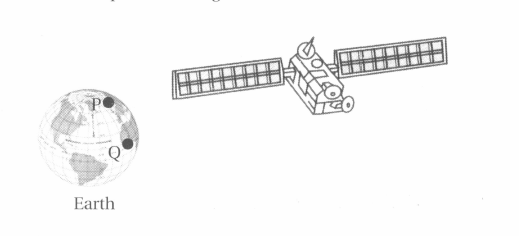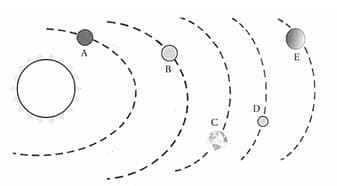Subject Experts Solutions for Chapter: Skywatch, Exercise 2: Topical Assessments
Subject Experts Science Solutions for Exercise - Subject Experts Solutions for Chapter: Skywatch, Exercise 2: Topical Assessments
Attempt the free practice questions on Chapter 9: Skywatch, Exercise 2: Topical Assessments with hints and solutions to strengthen your understanding. My Science Companion 5. solutions are prepared by Experienced Embibe Experts.
Questions from Subject Experts Solutions for Chapter: Skywatch, Exercise 2: Topical Assessments with Hints & Solutions
The diagram below shows a man-made satellite transmitting a signal from point P to point Q. Draw lines to show the path of the signal transmission.

Keerti observed the Moon over a period of 30 days. She noted that the Moon does not look the same every night. State two possible reasons why the Moon does NOT look the same each night.
Akhil, a 12—year old pupil, read from a reference book that the Moon can only be seen at night. He concluded that the Moon only gives off its own light at night. However, his classmate, Yeshwant, told him that he was incorrect.
If you were Akhil, how would you explain to Yeshwant why you can only see the Moon at night and NOT in the day?
Look at the diagram below carefully. It shows the orbits of five planets.
a. Planet D takes 400 days to complete one revolution around the Sun. Which planet do you think will take more than 400 days to complete ONE revolution around the Sun?
b. Which planet do you think will be the coldest?
c. Explain your answer in (b).
Swapna observed the Moon and the Sun during a Solar Eclipse. She commented that the Sun was hidden behind the clouds and that accounted for the dimness during the period whereby the Sun was not visible. Sarah disagreed with Swapna. If you were Sarah, explain how you would account for the dimness during the Solar Eclipse, and what would happen when the Sun is hidden behind the clouds.
Light travels in _____ line.
Fill in the blank with the most appropriate word:
A solar eclipse can occur only on a _____ (full moon day/ new moon day).
Fill in the blank with the correct option:
A lunar eclipse can occur only on a _____ day (full moon/ crescent moon/ half moon).

